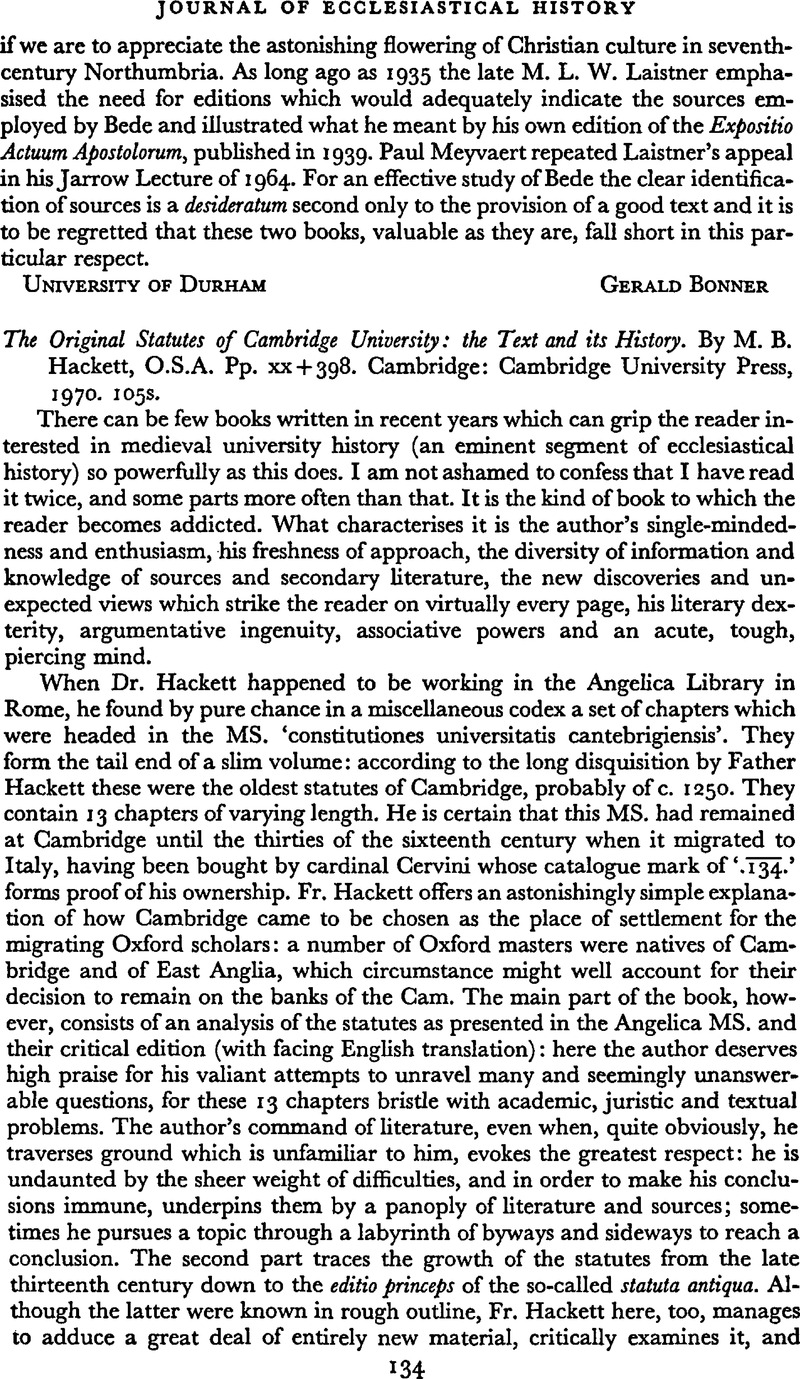No CrossRef data available.
Article contents
The Original Statutes of Cambridge University: the Text and its History. By M. B. Hackett, O.S.A. Pp. xx + 398. Cambridge: Cambridge University Press, 1970. 105s.
Published online by Cambridge University Press: 25 March 2011
Abstract

- Type
- Reviews
- Information
- Copyright
- Copyright © Cambridge University Press 1971
References
page 135 note 1 These statutes were printed by Savigny, F. C., Geschichte d. röm. Rechts im Mittelalter, 2nd ed.Heidelberg 1834Google Scholar, iii. 671 f.
page 135 note 2 Cf. Mercati, G. in Studi e Testi, lxxv (1938), 138 ffGoogle Scholar.
page 136 note 1 Which Fr. Hackett explains (105) by saying that the chancellor was institute d'primarily because a university experiences difficulty in reaching unanimity, a view which is as true today as when it was first stated by the Roman jurists, Paul and Ulpian’. One hopes that this is only a momentary aberration: there was no university at the time of Paulus and Ulpian. The Roman corporation was called in civil law a universitas to distinguish it from the singuli, and had nothing whatsoever to do with a university in the medieval or modern sense. The Roman law passage referred to (Dig. 41.2. 1 (22)) is not relevant o t this statute: ‘Municipes per se nihil possidere possunt, quia universi consentire non possunt’. Cf. further Dig. 38.3.1(1): ‘Movet enim, quod consentire non possunt’. The tenor of these (and other) Roman law passages deals with the incapacity of the universitas of formulating a juristically valid consent or will.
page 137 note 1 Cf., e.g., Hove, A. van, Prolegomena ad C.I.C, 2nd ed.Mechlin-Rome 1945Google Scholar, at 465: ‘Ius romanum erat principium et complementum studii iuris canonici’. See further, Kurtscheid, B. in Acta congressus iuridici internationalis, Rome 1935Google Scholar, ii. 311 ff., at 333 ff.; also Coing, H. in IRMAE, v. 2, Milan 1964, 69Google Scholar. But all this is so well known that no further comment is called for.
page 137 note 2 This statute deals with academical dress at lectures, etc., and, as such, can have nothing to do with the alleged absence of a civil law faculty, which Fr. Hackett believes did not come into being until after 1250. I entirely agree with him that Super specula is irrelevant to this issue. His statement (28 n. 1) about canon law may be slightly misleading: the term used in the statutes—decreta—does not necessarily mean the decretal collection of Gregory ix, but rather the Decretum of Gratian, hence also the Magister or Doctor Decretorum (never decretalium). In any case, the decretals of Gregory ix were a liber ordinarius: that they ‘had been made the subject of extraordinary lectures at Cambridge’ may be somewhat unusual and I find nothing in the statutes in support of this statement.
page 137 note 3 Tancred, Ordo iudiciarius, ii. 14, ed. F. Bergmann, 175: ‘Licet iura has cautiones praecipiat offerri, temporibus nostris eas praestari non videmus; et audivi dominum Azonem dicentem quod supradictae cautiones hodie locum non habent consuetudine praevalente’. This Ordo was written between 1214 and 1216.
page 138 note 1 Cf. the gloss on II.24.32, with its clear exposition of the difference between these two kinds of oaths.
page 138 note 2 See Clem., v. II.2: ‘Saepe contingit quod causas committimus et in earum aliquibus simpliciter et de plano ac sine strepitu et figura iudicii procedi mandamus, de quorum significatione verborum a multis contenditur …’.
page 138 note 3 Notably the juristic confusion surrounding the forum competens in statute xi.4 and its explanation at 26 ff., 52 ff., 96 ff., 168 f. That the redactors of the proper statutes realised this muddle is evident, because it never again reappeared.




